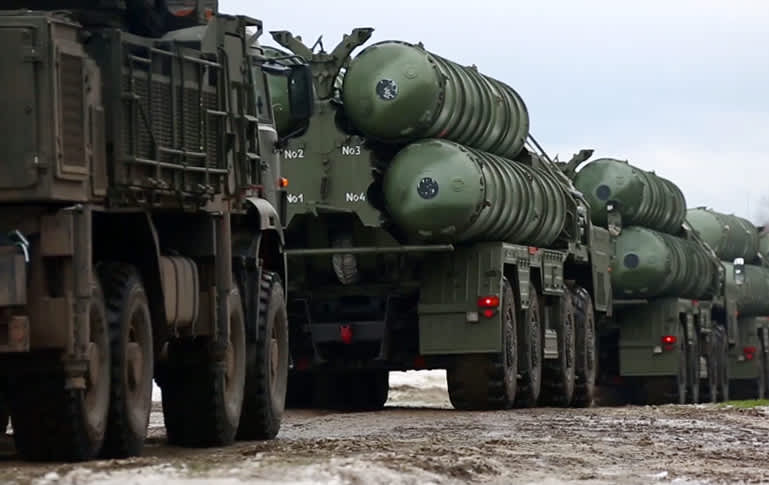
S-400 Triumf air defence missile systems during the Allied Resolve 2022 joint military drills by Belarusian and Russian troops.
Russian Defence Ministry | TASS | Getty Images
LONDON — NATO has accused Russia of increasing the number of troops it has amassed at the Ukrainian border a day after Moscow claimed it had begun withdrawing some of its military units.
Western leaders have warned that they are yet to see evidence of such a move, after a spokesman for the Russian Ministry of Defense announced on Tuesday that some units, having completed military drills near the border, were already on the move.
The Russian government released video footage on Wednesday which it claimed showed military units returning to their permanent deployments after completing exercises. CNBC has not been able to verify the authenticity of the footage.
Russian officials have also announced that troops engaging in military exercises in Belarus, to Ukraine’s north, would also be returning to their permanent bases on Feb. 20. However, Western leaders have cast doubt on Russia’s claims.
Russia ‘continues military buildup’
NATO defense ministers are due to meet in Brussels on Wednesday to discuss what the military alliance has called “the most serious security crisis we have faced in Europe for decades.”
Speaking to reporters ahead of the meeting on Wednesday, NATO chief Jens Stoltenberg said it “remains to be seen whether there is a Russian withdrawal.”
“So far, we have not seen any de-escalation on the ground. On the contrary it appears that Russia continues their military buildup,” he said.
Stoltenberg added that Russia has “always moved forces back and forth,” so footage that shows movement of forces and tanks “does not confirm a real withdrawal.”
Stoltenberg has said NATO allies “remain ready to engage with Russia.”
The Kremlin said Wednesday that NATO was “wrong” to say there is no evidence of Russian withdrawal from the border, Reuters reported, adding that President Vladimir Putin had a desire to negotiate diplomatically.
‘Mixed signals’
Meanwhile, U.K. Prime Minister Boris Johnson told Sky News on Wednesday that while the West has seen “some positive signs” from Russia, “the intelligence we’re seeing today is still not encouraging.”
“We’ve got Russian field hospitals being constructed near the border with Ukraine in Belarus, which can only be construed as preparation for an invasion,” he said. “So mixed signals, I think, at the moment.”
Johnson’s comments came after a warning from U.S. President Joe Biden on Tuesday that Washington had not yet confirmed that Russia had withdrawn any of its military units from the Ukrainian border.
“We have not yet verified that Russian military units are returning to their home bases. Indeed, our analysts indicate that they remain very much in a threatening position,” he said in a speech at the White House.
“And the fact remains [that] right now, Russia has more than 150,000 troops encircling Ukraine in Belarus and along Ukraine’s border.”
Warning that “an invasion remains distinctly possible,” Biden added that any use of force by Moscow would lead to “incredible human suffering.”
He urged Russia to choose a diplomatic path toward resolving the issue.
Thousands of Russian troops began engaging in military drills last week in a move that was widely seen as a display of strength by Moscow. The drills came as more than 100,000 soldiers, tanks, missiles and even fresh blood supplies had been moved to Russia’s border with Ukraine.
Moscow has repeatedly insisted it has no plans to invade Ukraine, despite warnings from Western countries in recent days that an invasion is likely to be imminent.
Russia is demanding that Ukraine never be permitted to become a NATO member, and has said it wants the organization to roll back its presence in Eastern Europe. Since 2002, Ukraine has sought entry into NATO, the world’s most powerful military alliance. The group’s Article 5 clause states that an attack on one member country is considered an attack on all of them.
The U.S. and NATO have said that such a request from Russia cannot be accommodated.
Speaking to European lawmakers on Wednesday, EU Commission President Ursula von der Leyen urged the Kremlin “not to unleash further violence in Europe.”
“Yesterday Russia was certainly sending conflicting signals,” she said. “On the one hand, authorities announced Russian troop pullbacks. On the other hand, the Duma [Russian Parliament] votes for full recognition of Donetsk and Luhansk as independent republics.”
The situation at Ukraine’s border is part of a broader, long-term issue.
Moscow annexed Crimea, a peninsula in southern Ukraine, in 2014, and around 13,000 people in the eastern region of Donbas have died in an ongoing conflict between government forces and pro-Russian separatists.
Russian lawmakers voted on Tuesday to ask Putin to recognize two Moscow-backed breakaway regions, Donetsk and Luhansk, as independent.




